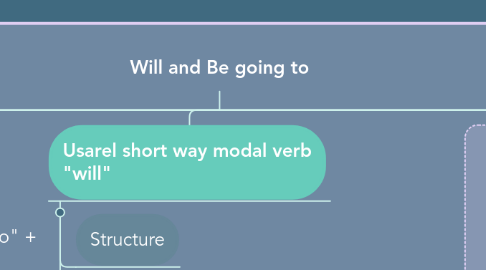Will and Be going to
by Valentina Rodriguez


1. She's not going to arrive late
2. Negative Sentences Sujeto + verbo auxiliar ("to be") + "not" + "going to" + verbo principal.
3. Structure Going to
3.1. Affirmative Sentences
3.2. She's going to arrive late
3.3. Interrogative Sentences Verbo auxiliar ("to be") + sujeto + "going to" + verbo principal.
3.3.1. Is she going to arrive late?
4. Will
4.1. Affirmative Sentences Sujeto + verbo auxiliar ("to be") + "going to" + verbo principal.
4.2. She will arrive late
4.3. Negative Sentences Sujeto + "will" + "not" + verbo principal.
4.3.1. She will not arrive late
4.4. Interrogative Sentences "Will" + sujeto + verbo principal.
4.5. Will she arrive late?
5. Usarel short way modal verb "will"
5.1. Structure
5.2. Affirmative Sentences Sujeto + “will” + verbo principal. I (I’ll) call you tonight
5.2.1. Negative Sentences Sujeto + “will” + “not” + verbo principal. I [won’t] call you tonight.
5.2.1.1. Interrogative Sentences “Will” + sujeto + verbo principal? Will you call me tonight?
6. Be going to is used to:
6.1. Plans
6.1.1. We're going to have a party tonight.
7. Will and be going to can be used for predictions
7.1. It will be a great party. / It's going to be a great party.
8. Will is used to:
8.1. Voluntary actions
8.1.1. They will clean their rooms.
8.2. Express a promise:
8.2.1. He promises he will call when he arrives
8.2.1.1. Decisions
8.2.1.1.1. I am hungry; I will make lunch.
9. The difference between "going to" and "will"
9.1. WILL: It is the sense of planning and probability of an action happening.
9.1.1. GOING TO: ”for concrete plans, when we are sure that something is going to happen.
